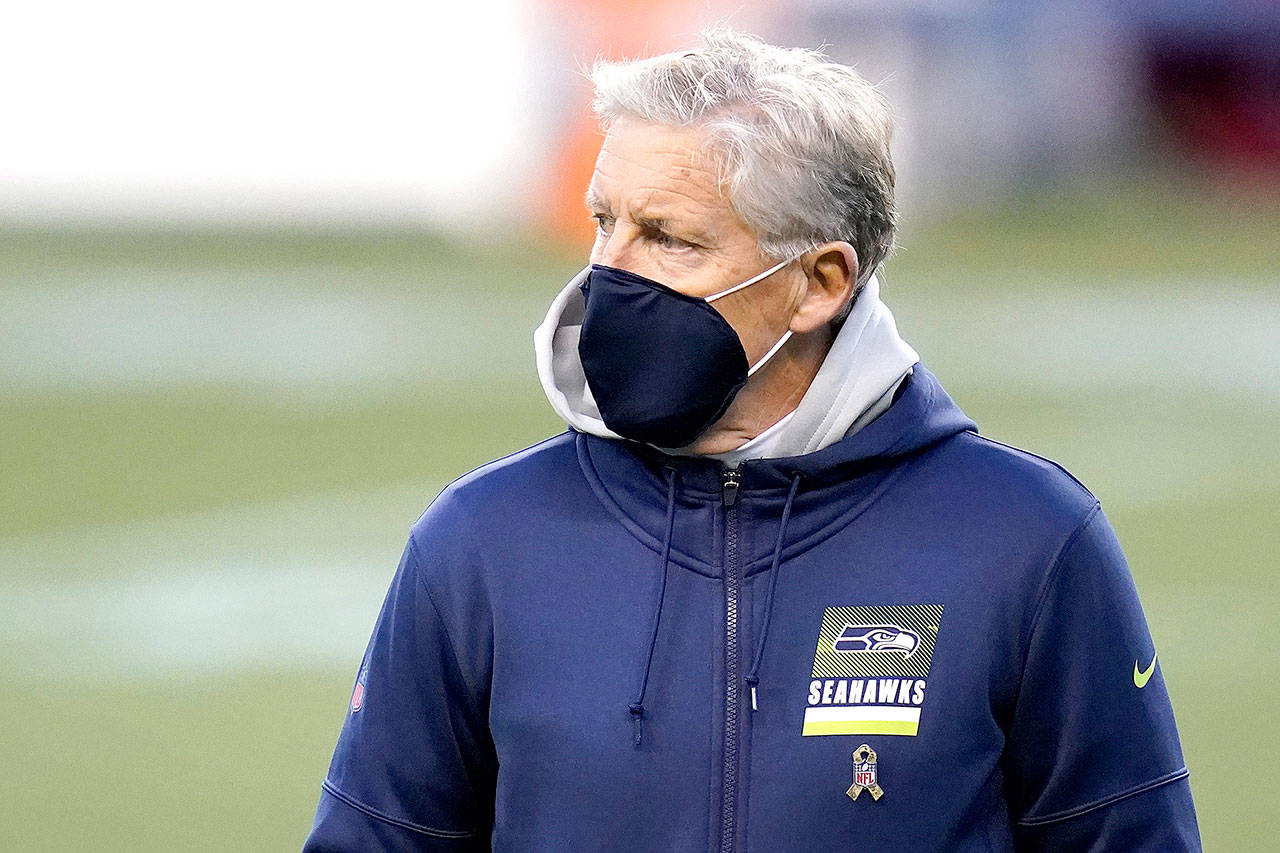By Gregg Bell | McClatchy News Service
RENTON — Their relatively few in-person meetings are inside, in the biggest space they have.
Those team gatherings take up half their 100-plus-yard indoor field at Seahawks headquarters. The rest of their meetings, including film breakdown the day after games, take place remotely, in the way of 2020: online via team-, unit- or position-wide Zoom calls.
The NFL enhanced its testing and safety protocols for COVID-19 yet again in the last week, to combat the ongoing spread of the coronavirus across the country and league. As Baltimore was becoming the latest team with multiple cases, the NFL told all clubs that beginning last Saturday they must adhere to the intensive protocol the NFL had enacted Oct. 1 for any team that had multiple positive cases for COVID-19.
The Seahawks? They are complying by merely tweaking most of what they had already been doing.
That’s one of the reasons Seattle is (knock on its Evergreen wood) the only NFL team to not have a true positive case for the coronavirus since testing began July 28 with the start of training camp.
“Indoors, we have our team meetings and it takes up almost 50 yards of the field. Everybody is spread out,” coach Pete Carroll said.
The Seahawks players are now, as of this week, 10 feet apart in those meetings, instead of 6.
“We virtually meet on Monday. Guys are at home for Zoom meetings in the recap and telecommute Monday and all that,” Carroll said.
To cut down on how long players spend in the locker room in relatively close quarters, Carroll has condensed the time between the Seahawks’ morning walk-through and their main, afternoon practices.
It’s another way they continue pushing to stay ahead in the pandemic.
The 69-year-old coach has said he and his wife Glena are taking it as personal challenges to not contract the coronavirus. He’s extended that challenge to his team. He’s made not getting COVID-19 a part of his daily competition ethos. He has competitions among position groups over who has proven to be the most COVID-19 aware and safe, who is winning at keeping socially distant.
Yes, the Seahawks can measure that. It’s through the contract tracers the players and everyone inside the team facility must wear each day. The tracers emit a loud, incessant beeping anytime someone comes within 6 feet of someone else. That beeping has become more of a football sound than that of coaches’ whistles this unprecedented NFL season amid the pandemic.
All-Pro Bobby Wagner said this summer: “At the end of the day, it’s going to be a lot of self-discipline.”
It has been. And so far, four months into testing and 11 weeks into the season, the Seahawks (7-3) are winning at self-discipline, too.
The challenge
No matter how far they go into the playoffs this season, this may already be the best leadership work of Carroll’s coaching career.
“The thing that’s going on here is it’s recognizing the constant challenge and making efforts to stay abreast with that challenge calls for,” he said.
The Seahawks are beating that challenge with money. They are spending upwards of $40 million for daily COVID-19 testing. It’s done by tireless, energetic and fun-loving technicians from the NFL-contracted BioReference Laboratories, who report to work before dawn each day to trailers parked just outside the Seahawks’ team facility.
Players, coaches and staff report there by 9 a.m. seven days per week (and at the team hotel on game days) to get cotton swabs swirled around the inside fronts of each nasal cavity. Those swabs are sealed in vials and transported to the airport. Each afternoon a pilot flies a chartered plane with those Seahawks’ tests onboard to Burbank, Calif., to have the results processed and reported back to the team within 12-18 hours. That’s so each person tested can be cleared to go back into the Seahawks’ facility the next day.
Each morning, including weekends and holidays, the testing process repeats itself. So does the process of flying the tests to Burbank each afternoon and returning a plane to Seattle in time for the next day’s run. A couple technicians even fly on the team plane with the Seahawks to road games, to continue the testing each morning at their road hotels.
Not every team has had their technicians fly on the charter with it. Some have had their lab techs fly commercially to meet the team at a road city. But the Seahawks see that as an unnecessary risk of exposure to the virus. So they give the techs seats on their plane.
Though he says the financial hardships of small businesses in the Seattle area pain him, Carroll has told his players not to eat at restaurants. He’s had the team’s food-services staff prepare whole, multiple meals for each player so they don’t have to go out to eat — and if they do, make it take out. That is, if they don’t already have a personal chef, as many do.
“I can see why people on the outside run into problems (contracting COVID-19), because you need structure and you need guidelines and you need goals and, you know, motivation and attitude and so forth. All of those elements,” Carroll said. “Without those, people are left up to their own. They’ve got to figure it out. (They’ve) easily wandered into the problem areas.”

